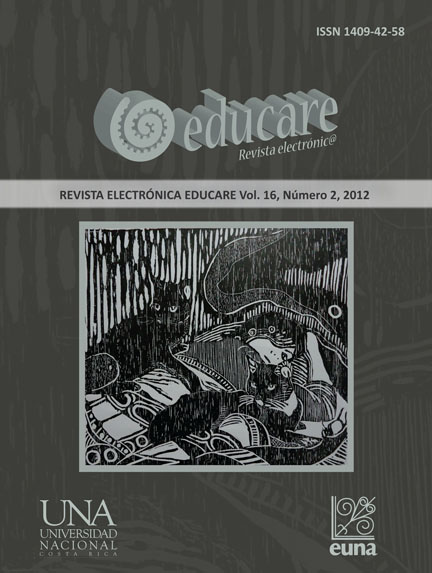Education with Ecological Roots
DOI:
https://doi.org/10.15359/ree.16-2.13Keywords:
Modernity, paradigm, mechanistic, ecological, education, context.Abstract
This paper explains how modernity develops its own form of education to achieve its objective of conquering nature, and the related environmental consequences. In this context, this paper proposes a new education nurtured from ecological knowledge, leaving behind the fragmentary and mechanic mission of the world –a characteristic of modernity– to promote an alternative awareness focused on a new way of relationships with our natural environment and other individuals.
References
Bacon, F. (2006). La nueva Atlántida. Madrid: Ediciones AKAL.
Damián, V. (1997). Educación holista para una conciencia planetaria. En R. Gallegos (Comp.), El
destino indivisible de la Educación. Propuesta holística para redefinir el diálogo humanidadnaturaleza
en la enseñana (pp. 9-32). México: Pax.
Dyson, F. (1998). Mundos del futuro. Barcelona: Grijalbo.
Gallegos, R. (Comp.). (1997). El destino indivisible de la Educación. Propuesta holística para redefinir
el diálogo humanidad-naturaleza en la enseñanza. México: Pax.
Lovelock, J. (2000). Las edades de Gaia. Una biografía de nuestro planeta vivo (3ª. ed.). Barcelona:
Tusquets Editores.
Morin, E. (2002). La cabeza bien puesta: Repensar la reforma. Reformar el pensamiento. Buenos Aires,
Argentina: Ediciones Nueva Visión. Recuperado de http://es.scribd.com/doc/43009388/
Morin-1999-La-Cabeza-Bien-Puesta
Perry, T. (1970). Home, [Guión de película para serie de televisión] En J. Stevens (Productor).
Comisión de Radio y Televisión de los Bautistas del Sur.
Sheldrake, R. (1994). El renacimiento de la naturaleza. La nueva imagen de la ciencia y de Dios.
España: Paidos.
Snow, P. (1997). Educación holística y transformación humana. En R. Gallegos Nava, (Comp.). El
destino indivisible de la Educación. Propuesta holística para redefinir el diálogo humanidadnaturaleza
en la enseñana (pp. 140-141). Pax: México.
Downloads
Published
How to Cite
Issue
Section
License
1. In case the submitted paper is accepted for publication, the author(s) FREELY, COSTLESS, EXCLUSIVELY AND FOR AN INDEFINITE TERM transfer copyrights and patrimonial rights to Universidad Nacional (UNA, Costa Rica). For more details check the Originality Statement and Copyright Transfer Agreement
2. REUTILIZATION RIGHTS: UNA authorizes authors to use, for any purpose (among them selfarchiving or autoarchiving) and to publish in the Internet in any electronic site, the paper´'s final version, both approved and published (post print), as long as it is done with a non commercial purpose, does not generate derivates without previous consentment and recognizes both publisher's name and authorship.
3. The submission and possible publication of the paper in the Educare Electronic Journal is ruled by the Journal’s editorial policies, the institutional rules of Universidad Nacional and the laws of the Republic of Costa Rica. Additionally, any possible difference of opinion or future dispute shall be settled in accordance with the mechanisms of Alternative Dispute Resolution and the Costa Rican Jurisdiction.
4. In all cases, it is understood that the opinions issued are those of the authors and do not necessarily reflect the position and opinion of Educare, CIDE or Universidad Nacional, Costa Rica. It is also understood that, in the exercise of academic freedom, the authors have carried out a rogorous scientific-academic process of research, reflection and argumentation thar lays within the thematic scope of interest of the Journal.
5. The papers published by Educare Electronic Journal use a Creative Commons License:

















 The articles published by Educare Electronic Journal can be shared with a Creative Commons License:
The articles published by Educare Electronic Journal can be shared with a Creative Commons License: 



